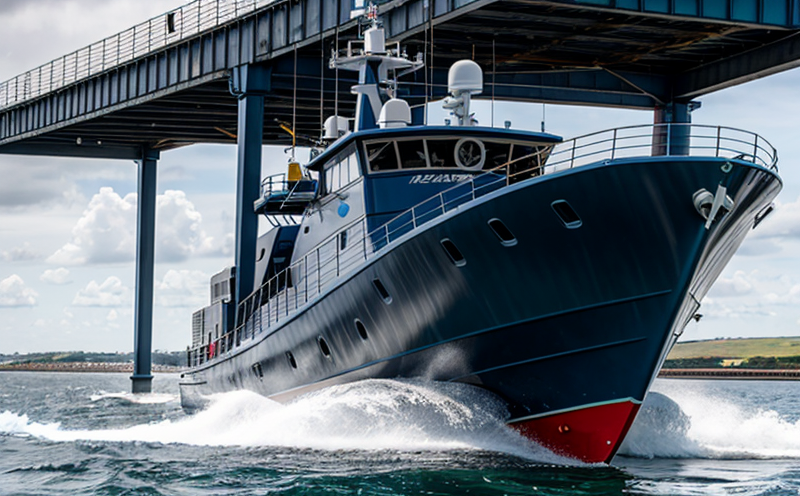ISO 13691 Gas Turbine Marine Propulsion Testing
The ISO 13691 standard is a critical framework used in the marine and ship equipment testing sector, specifically for ensuring that gas turbine propulsion systems meet stringent performance and safety standards. This service focuses on testing these systems to ensure they operate efficiently and safely under real-world conditions. Compliance with this standard is essential for maintaining high reliability and minimizing downtime, which are crucial aspects of maritime operations.
Gas turbines in marine applications must endure harsh environmental conditions including saltwater corrosion, extreme temperature changes, and continuous operation over extended periods. The ISO 13691 testing protocol addresses these challenges by simulating the operational environment through a series of tests designed to mimic real-world conditions. This includes fuel consumption analysis, emissions measurement, mechanical stress evaluation, and thermal efficiency checks.
Compliance with this standard is mandatory for manufacturers aiming to enter international markets where stringent regulations apply. The testing process involves rigorous procedures that include specimen preparation, instrument calibration, and data collection. Specimens are typically engine assemblies or complete propulsion systems that undergo a series of performance trials under controlled conditions. These trials assess various parameters such as fuel consumption rates, exhaust gas temperatures, and vibration levels.
The ISO 13691 standard ensures consistency across different testing laboratories by providing detailed guidelines on test methods and acceptance criteria. This is particularly important in the marine industry where safety and reliability are paramount. Laboratories adhering to this standard must follow a structured approach that includes initial setup checks, real-time monitoring during tests, and comprehensive post-test analysis.
The benefits of ISO 13691 compliance extend beyond mere regulatory adherence; it enhances brand reputation by demonstrating commitment to quality and safety. Additionally, compliant products are more likely to gain market acceptance due to their proven performance and reliability. Compliance also facilitates smoother interactions with regulators and ensures that all stakeholders have confidence in the product's capabilities.
- Enhanced Reliability: Ensures consistent performance under various operational conditions.
- Improved Safety: Reduces risk of failure during critical operations at sea.
- Market Access: Facilitates entry into international markets with stringent regulatory requirements.
- Reputation Boost: Builds trust among customers and industry partners by highlighting adherence to recognized standards.
In summary, ISO 13691 gas turbine marine propulsion testing is a vital process that underpins the reliability and safety of marine engines. By adhering to this standard, manufacturers can ensure their products meet the highest international quality and performance benchmarks, thereby enhancing both operational efficiency and safety in maritime environments.
Benefits
The ISO 13691 gas turbine marine propulsion testing offers several key advantages:
- Enhanced Reliability: Ensures consistent performance under various operational conditions, which is crucial for maintaining high reliability in harsh maritime environments.
- Improved Safety: Reduces the risk of failure during critical operations at sea, thereby enhancing safety standards.
- Market Access: Facilitates entry into international markets with stringent regulatory requirements, opening up new business opportunities for manufacturers and suppliers.
- Reputation Boost: Builds trust among customers and industry partners by highlighting adherence to recognized standards, thus improving brand reputation.
- Cost Efficiency: Although the initial cost of compliance can be high, it ultimately leads to reduced maintenance costs and extended product life due to improved quality and reliability.
- Sustainability: The tests help in reducing fuel consumption and emissions, contributing positively to environmental sustainability efforts.
These benefits underscore why compliance with ISO 13691 is not just a regulatory requirement but also a strategic decision for manufacturers aiming to maintain global competitiveness and ensure product excellence.
Industry Applications
The application of ISO 13691 gas turbine marine propulsion testing is widespread across the maritime industry, encompassing various sectors such as commercial shipping, offshore oil rigs, naval vessels, cruise liners, and fishing fleets. This standard ensures that all types of gas turbines used in marine propulsion systems meet the highest international quality and performance benchmarks.
For commercial ships, compliance with this standard guarantees efficient fuel consumption rates, which can significantly reduce operational costs. In offshore operations, where safety is paramount, adherence to ISO 13691 helps prevent accidents by ensuring that all components function optimally under extreme conditions. For naval vessels, the reliability and performance of propulsion systems are critical for mission success, making this standard indispensable.
Cruise liners benefit from enhanced passenger comfort and reduced environmental impact due to optimized fuel efficiency. Fishing fleets can enjoy extended operational periods without compromising safety or performance. Overall, ISO 13691 testing ensures that gas turbines in marine applications operate reliably, safely, and efficiently across diverse maritime environments.
Use Cases and Application Examples
ISO 13691 gas turbine marine propulsion testing is used in various scenarios to ensure the reliability and safety of propulsion systems. Here are some specific use cases:
- New Product Development: Manufacturers use ISO 13691 tests during the R&D phase to validate new designs before mass production.
- Compliance Audits: Regular testing ensures ongoing compliance with regulatory standards, preventing potential penalties and fines.
- Quality Control: Laboratories conduct routine checks on completed units to ensure they meet all specified performance criteria.
- Performance Optimization: By identifying areas for improvement through rigorous testing, manufacturers can refine their products and enhance overall efficiency.
- Accreditation: Many marine equipment suppliers seek accreditation based on successful ISO 13691 tests to gain market recognition.
- Research and Development: Universities and research institutions use this standard in academic studies, contributing valuable insights into gas turbine performance.
- After-Sales Support: Manufacturers can provide evidence of product reliability through ISO 13691 compliance to reassure customers about the longevity of their investments.
These examples illustrate how ISO 13691 testing plays a crucial role in maintaining high standards across the marine industry, from R&D to final product delivery.





